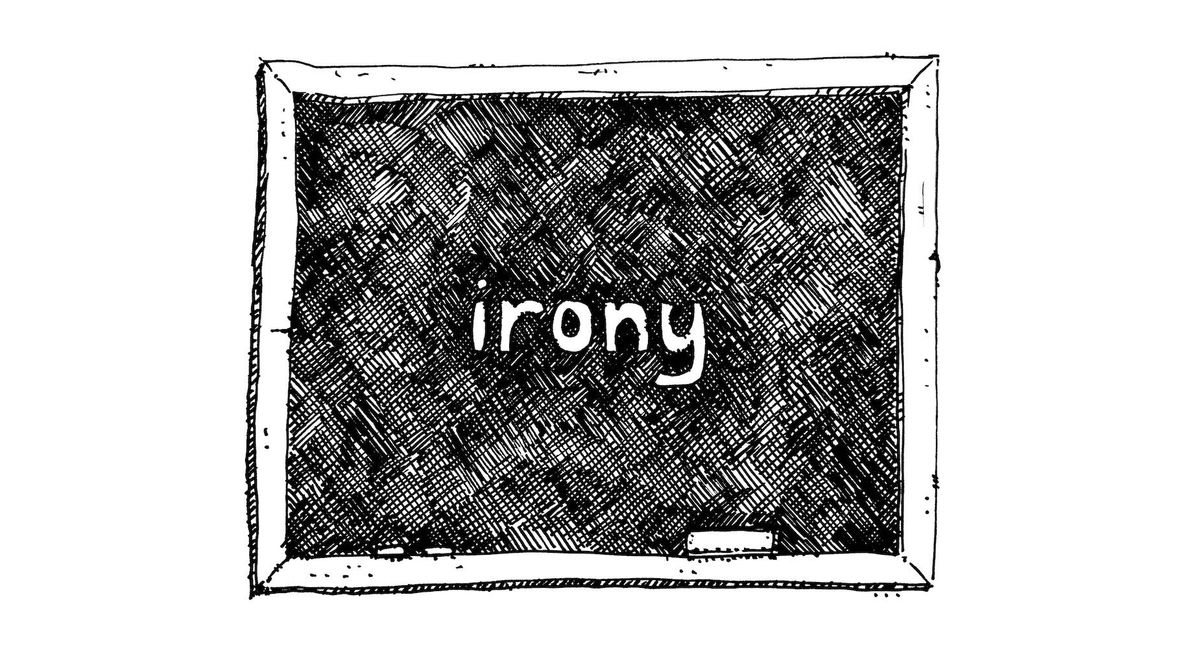Teaching irony
Demonstrating how irony works by living ironically

“So, sir, what does ‘irony’ actually mean?”
“Ah, well, that’s a good question. One kind of irony is when in the pursuit of one thing you achieve the opposite of what you intended.”
“Like what, sir?”
“Well, the other day I had socks on and I wanted to go out on the deck, but it was wet outside and it had been raining for a while (so I had run out of socks, except for the pair I was wearing). So I started to put on my gumboots, which were beside the door, but I didn’t realise that they were full of water, so that one sock got completely wet. So then I only had one sock for work. So, in trying to keep my socks dry, I made them wet.”
“You should have checked, sir.”
“My gumboots?”
“Yeah, you should have checked your gumboots. So ‘irony’ is like, being careless?”
“No, it’s when something turns out odd or funny because things pan out the opposite to what you expect. This is actually close to some theories of what humour is: the subversion of our expectations in a way that surprises and entertains us.”
“What does ‘subversion’ mean?”
“Um, in this example, the simplest definition is perhaps ‘to go against’.”
“So irony can be funny, sir?”
“The conditions for humour and irony are somewhat similar, so often, yes. Maybe that’s why, in one form or another, videos of people having accidents doing everyday things have remained very popular over time.”
“Your gumboot story wasn’t very funny, sir. And it took you a while to get to the point.”
“Yes, that’s true. How about this one: When I lived in Japan, one time I was riding my bike and rushing to the train station to get to a doctor’s appointment at the hospital. The bike had a dynamo, and it was whirring like crazy.”
“Wait, what’s a ‘dynamo’?”
“It’s, um, a light on the front of your bike that’s powered by the front wheel turning; you can turn it on and off with your toe.”
“Okay, carry on.”
“Well, the dynamo was whirring like crazy from riding in the dark on the previous evening, so I went to turn it off with my toe, as I’d done a thousand times before.”
“Is ‘a thousand times’ irony?”
“Well no, that would be exaggeration or ‘hyperbole’ – except not really, because if I did the maths it may well actually have been about a thousand times over the course of three years. Anyway: My toe slipped, and went into the spokes, and the front wheel jammed with my foot in it, and I flew over the handlebars.”
“That sounds more tragic than ironic.”
“Well, there’s even another form of irony, ‘dramatic irony’, which is where the people watching a character – like in a play – understand the meaning behind what is happening even when the character themself doesn’t.”
“Okay, that one seems a bit confusing.”
“You’re right, I’m confusing things. Anyway: This episode with the bike is ironic because in rushing to the hospital to get attention for one injury, I ended up giving myself a more serious injury. After I saw the doctor he asked if there was anything else I needed, so I showed him my terrible, swollen elbow and he said it was almost certainly broken.”
“Okay.”
“‘Okay’? That was the best personal example of irony I could think of. Oh well.”
“I think I understand the irony, sir, but it’s not funny. I thought you said something about it needing to be funny.
“Yes, humour can be part of it. Another form of irony is when you use language that’s intentionally the opposite of what you really mean, often to be funny. But irony isn’t always about the LOLs.”
“Argh. Too many ironies. This is confusing. You should have stopped at one.”
“Oh, well, fair point.”
“So, like, ‘We always enjoy your English class, Mr Allardice’ could be irony then?”
“Because you don’t always enjoy my class?”
“Yeah. Well, not always. Sorry.”
“I’m not sure if that’s the best example of irony. Perhaps just cutting sarcasm. Or straight-up cruelty? There is some overlap between this kind of irony and sarcasm.”
“So sir.”
“Yeah.”
“You wanted the class to understand what ‘irony’ means, but now that we’ve heard your explanation it seems like we understand what ‘irony’ means even less. Is that irony?”
“Well, I guess you could call that irony, of a kind.”
“That’s the bell, sir.”
“It is.”
“We didn’t finish our talk about irony. That’s ironic.”
“Um. Kind of.”



Comments ()